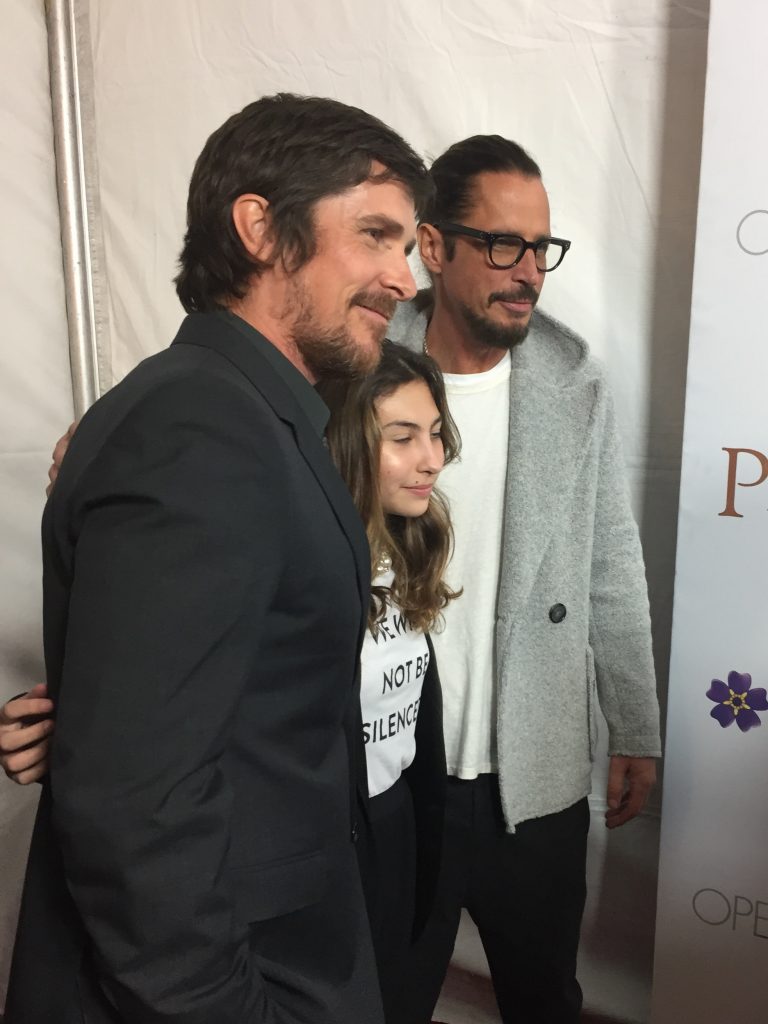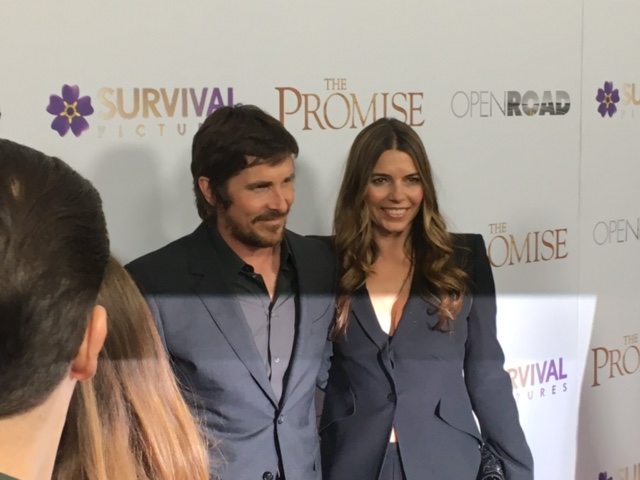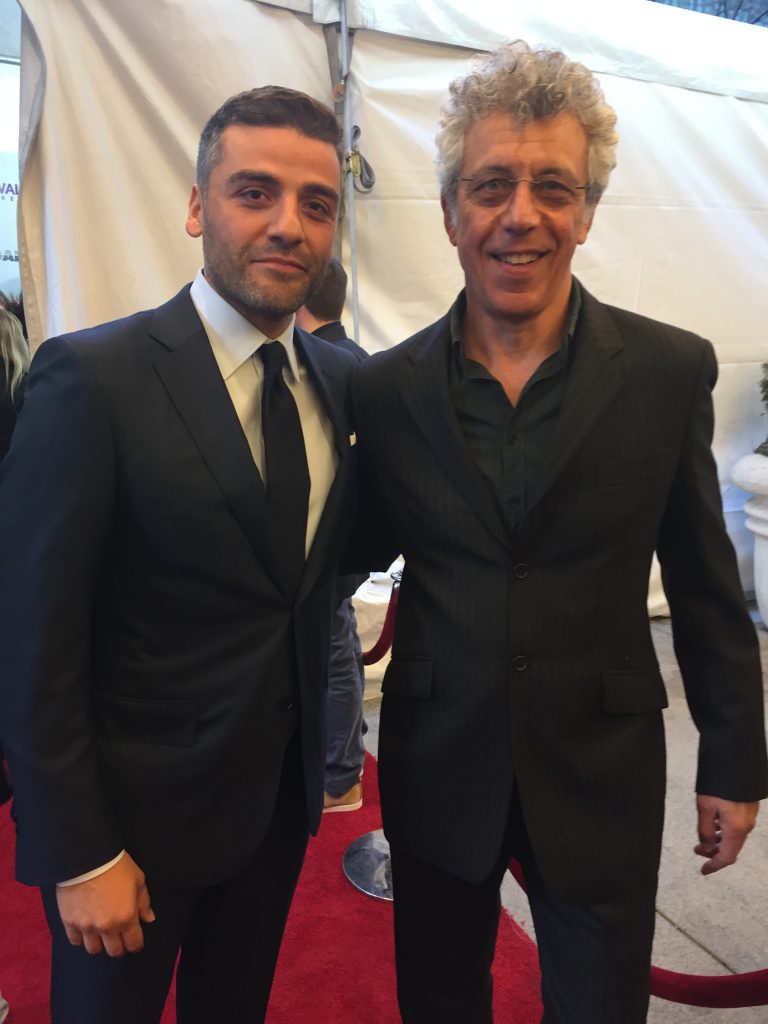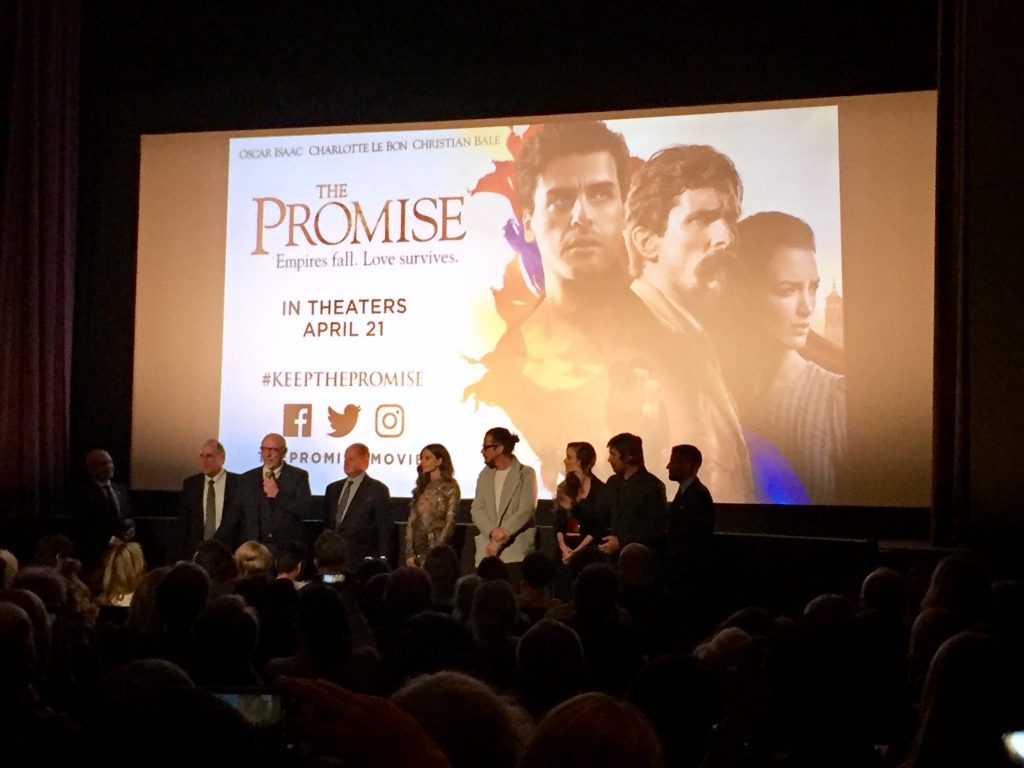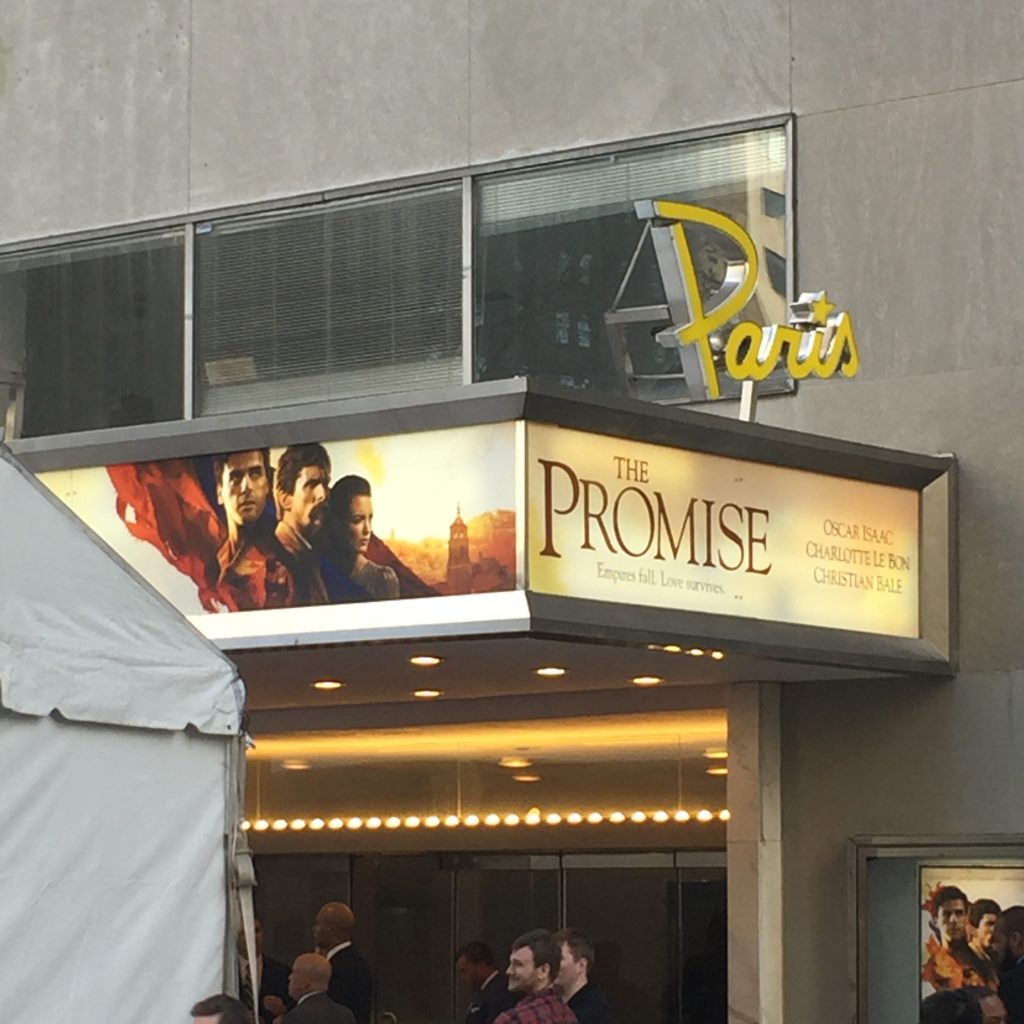The Promise Debuts in New York City at the Paris Theater
Special to the Armenian Weekly and Asbarez
NEW YORK (A.W./Asbarez)—The highly anticipated feature film The Promise made its New York City debut on April 18 at the Paris Theater on 58th Street. The cast came out in full force as Christian Bale, Charlotte Le Bon, Oscar Isaac, Angela Sarafyan, James Cromwell, and Chris Cornell made their way down the red carpet, alongside director/co-writer Terry George and several of the film’s producers, helmed by Eric Esrailian (Survival Pictures). Also in attendance was the evening’s co-host, Ambassador Zohrab Mnatsakanyan, Permanent Representative of Armenia to the United Nations (UN), and several other respected UN dignitaries.
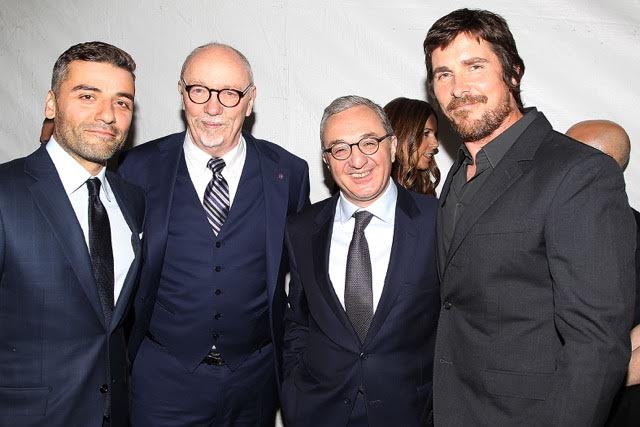
(L to R) Oscar Isaac, Terry George, Armenia’s Ambassador to the UN Zohrab Mnatsakankyan, and Christian Bale (Photo: Hooshere Bezdikian)
Producer Eric Esrailian passionately described the mission of the film:“First of all, we wanted to tell a beautiful story and draw people in and raise awareness about the history of the Armenian people and the Armenian Genocide. We know that Armenians are not defined by genocide, but we want the genocide to be recognized and to not be forgotten.”
Set against the backdrop of the Armenian Genocide, The Promise centers around a young Armenian woman, Ana Khesarian (Charlotte Le Bon) who leaves Paris to return to her homeland, where she gets entangled with AP journalist Chris Myers (Christian Bale) and then meets Armenian medical student, Mikael Boghosian (Oscar Isaac), with whom she unexpectedly finds common ground. The film is, at its core, a love story—intentionally designed as such to make the film more appealing and accessible to broader movie-going audiences.
As James Cromwell, who plays Henry Morgenthau, United States Ambassador to the Ottoman Empire describes, “The love story is a way of getting people to begin the process, to feel for the characters, and then understand… can we not have compassion for people who are suffering around the world today? If we can have compassion for them, we can have compassion for the Armenians. If we can have compassion for the Armenians, then we have compassion for the Native Americans, and it goes on… it’s to open the heart.”
Esrailian addressed the importance of combatting the aggressive denial of the genocide on behalf of the Turkish government, while simultaneously depicting the resilience of the Armenian people. “As long as there is deep denial,” Esrailian explains, “our identity and the awareness of our culture will be viewed through a different lens, and it’s important to have that recognition and awareness while moving forward at the same time. Armenians have not stood still and hoped for genocide recognition. This is the mission and the message from the film—the take home is not the genocide—it’s where we are today; that Armenians have persevered, have thrived, have contributed to society.”
This very survival and perseverance is why Esrailian chose to include the Armenian flag in the official movie poster, a choice that some have criticized, citing that the flag did not exist in 1915. Esrailian rebuts, “That’s the type of thinking that doesn’t help the Armenian people. The genocide reflects the past, and the flag represents the future. When is the next time the Armenian flag is going to be on the poster of a major motion picture?”
Ambassador Zohrab Mnatsakanyan anticipated, “There will be many judgements about the artistic value of the film” and went on to emphasize “what is important about this film is that it’s a building block in the big construction of preventing genocide. This is a reminder that atrocities are still a risk before humanity. We as Armenians have experienced it, and I think we all bear moral duty before humanity to prevent genocide.”
To that same end, Esrailian stressed: “Our goal is to draw attention to the parallels of human rights abuses in the world today, the relevance to the world today, to show that Armenians also care about other people all around the world, including in Turkey, and that people need to learn the lessons from the Armenian Genocide so that we can help others in the world who are at risk. We have to show that the denialists and people who are complicit in human rights abuse—and many of those people are in the same camp—are using the same tactics today to commit human rights abuses that they did to the Armenian people in 1915 and beyond. So it’s really important to draw attention to why people are denying, what are the tactics they’re using, demonstrate that what happened to the Armenian people unfortunately is not a unique situation—we’re connected to all these other groups that have suffered atrocities as well—and that we need to basically come together to once and for all say never forget and then do everything we can for the ‘never again’ component of it.”
Bringing The Promise to the big screen was no easy task. Christian Bale was drawn to the project for that very reason. “I learned about the efforts to get a major film made, and how over the decades it’s really been thwarted. Kirk Kerkorian himself, owning, running MGM was not able to do it at that time.” He went on to admit that, “embarrassingly, and I think quite commonly, I learned about the Armenian Genocide really around the same time that the hundredth anniversary was happening, and it was stunning to me that such an atrocity is largely unknown. It’s this great unknown genocide, but it’s modern history. And the consequences—or lack of consequences—for this probably provoked many of the other genocides we’ve seen since.”
Bale found himself drawing parallels to current events: “And I was reading the script, Musa Dagh, the seizure on the mountain, and I was watching the news, and there were the Yazidis under siege being slaughtered, and it just made me realize how relevant this story was.”
Bale was also inspired by the fact that the filmmakers were going to give all of the film’s proceeds to charity. “It’s unheard of, at least for me, that any film has ever said 100% of proceeds will go towards charities involved with addressing human rights abuses and holding people accountable.”
Terry George, the film’s director and co-writer cited awareness as the main objective of the film, “so that as many people around the world can see it and say, I didn’t know about this, this shouldn’t have happened, what a horrible thing, and how can I help prevent this in the future and gain recognition for the Armenian people.” A prolific filmmaker of such impactful films as Hotel Rwanda and In the Name of the Father, George gratefully credits Kerkorian for his generous backing of the project, and cites the timeline as his toughest challenge in making the film: “We had 70 days for what should have been a 150-day movie. So we never slept, but everybody ran as fast as they could.”
When asked about continued genocide denial, producer Mike Medavoy commented: “The Turks are speaking against history. It’s pretty clear what happened. Stop denying it. And move on.” He credited Esrailian and Kerkorian for ensuring the project was executed as they had intended: “They were determined to do this right. They did everything they could to do it right. That, to me, is the mark of how good the film is.”
Actor/author/historian Eric Bogosian underscored that point, noting that the director consulted with him to ensure the film was as true to history as possible. “Terry [George] and I had gone over the notes—and even though it’s fictional, it’s all correct, in its dimensions, in all the aspects. And that’s really, very hard to do. I really commend them for having gotten the story right. This isn’t some exaggeration on any level. In fact, there is no way to really tell the story in its true depth of horror,” Bogosian said.
He then describes the film as “an important counter-strike to [Turkey’s] endless repression of the truth” and further commends it by adding, “The key thing is memorializing those who are gone properly. It’s really a sin to not adequately memorialize what had happened. So in this regard, we do.”
Angela Sarafyan, who plays a young woman named Maral, shared what it was like being part of the film as an Armenian: “It’s very surreal and very moving—there was one scene that was particularly heart wrenching. It was a regular day on set, but the truth it, it’s very heartbreaking, and I started to get very emotional after shooting that particular scene.”
Also in attendance was Bob Morgenthau, great grandson of Henry Morgenthau. “I know that my great grandfather would have given the strongest possible endorsement to The Promise. He wrote in 1918 that ‘all eyewitnesses to this, the greatest crime in modern history, should volunteer their testimony.’ With the passage of time, there are no more first-hand memories, but Eric Esrailian, Terry George and the fantastic cast have succeeded in bringing the story to life so we can all be eyewitnesses.”
Morgenthau was delighted to meet James Cromwell at the premiere, saying “On a personal note, it is a thrill to see him bring my great grandfather to life, skillfully portraying a mixture of gravitas and outrage. I thought it was an inspired bit of casting as Cromwell is also a principled activist who stands up for the causes he believes in.”
Cromwell commented on how interesting it will be to see what impact this film will have in Turkey today. “I’ve talked to many Turks, and their blindness to it is based on the fact that in the back of their brain, they know something is off, and they can’t afford to admit it. So all the film needs to do is push that into their frontal lobes, into their consciousness, and to finally begin to whisper among each other ‘This is not right, this is not right’,” Cromwell said.
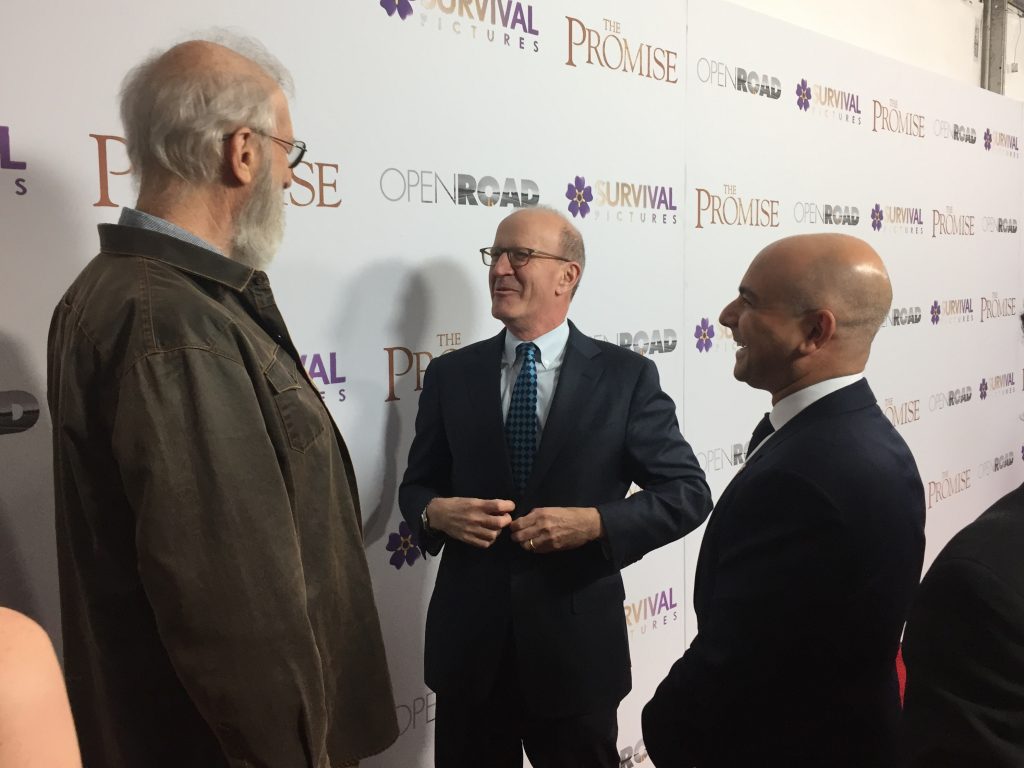
Eric Esrailian (R) introducing Bob Morgenthau (center) to James Cromwell (L) (Photo: Hooshere Bezdikian)
Esrailian spoke very humbly about his accomplishments to date in the making of this film: “I truly feel it’s an honor and I don’t feel that we’ve have accomplished anything just yet. This is just the beginning–the beginning of a long road of giving back to our community, giving them something that they can point to and be proud of, in addition to all the other accomplishments Armenians have achieved, and to really pay respect to Kirk because it wouldn’t have happened without him. Armenians need to know that he never asked anyone for anything. This is an opportunity for us to give back through the film, and to him, by supporting the film, particularly on opening weekend. It’s really critical.”
The Promise opens in theaters nationwide on Friday, April 21.
